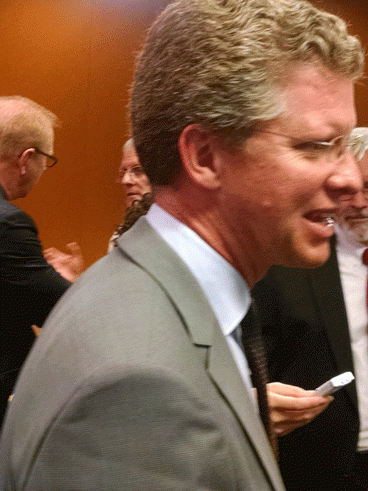The new meme for saving the world from climate change, now that Al Gore's 2008 challenge to prevent it is moot, is not the nonpartisan erewhon of "work like hell to re-source energy," but rather "resilience."
We must fight back against the reality of climate change. This has to happen to save not so much the world as our presence on it. We must promote resilience to climate change on the ground, above it, and below it.
In both his first public speech since his swearing in as Director of the White House Management and Budget office (OMB) last July, and his first public speech on environmentalism, Shaun Donovan emphasized the need for resilience.
We must prepare ourselves for the destructiveness of climate change. Huge damage is already apparent in the rising temperatures--thirteen out of the fourteen of the warmest years in history have occurred since 2000--increased fierceness of storms and incidents of wildfires, the melting of the solar icecap, the years-long drought in California--in 2012 the worst drought in fifty years occurred there--and flooding.
More resilient infrastructure is needed than our outdated, sometimes-collapsing vestiges. Subsidized housing for the poor must be rebuilt to withstand "natural" disasters. For the first time in history, more than half of the world's population live in cities, and somehow they occupy the structures closest to water, for most major cities are built close to the sea, and are thereby the most vulnerable--forget about waterfront condominiums.
In New Orleans Hurricane Katrina wrought the most damage on indigent neighborhoods, coincidentally on the lowest ground of this below-sea-level city. The rich were far less affected in their double-gallery homes and villas on higher ground.
Director Donovan has already budgeted billions on behalf of public housing and other exigencies as the former Secretary of Housing and Development (HUD). As head of the Hurricane Sandy task force, working across all of the cabinet and other government agencies concerned with the environment, which he said, comprises all of them, he witnessed the devastation firsthand, laboring to rebuild lives--160 were killed--and the structures that housed them. The cost of federal government intervention was $60 billion. The project is ongoing. The scope is incredible. And it will happen again.
But why should a dollar data-crunching office like OMB be so concerned with climate change? Well, said Donovan, their purview exceeds spreadsheets, having encompassed the Affordable Care Act as well as every government agency--the bucks stop at OMB for cost-benefit analyses of every single regulation, a gargantuan, quintessentially complicated workload. Underinvestment is not an option. Federal funding is crucial.
Donovan recalled Roy Ash, the first director of the OMB in 1970, who was instrumental in the establishment of EPA also in 1970 to protect human health and the environment, a Nixon appointee helping to implement RMN's brainchild. (Ironically, it was Earth Day, born April 22, 1970, that was the last straw for corporate attorney [and subsequent SCOTUS appointee two months later] Louis Powell, whose 1971 manifesto instigated the gradual corporate takeover of the economy and with it our democracy. This insidious process culminated in the Citizens United Supreme Court decision and its McCutcheon and Hobby Lobby offspring, mangling the First Amendment as much as the corporate takeover has wreaked havoc on the environment.)
(And so these disparate courses were both set by the Nixon administration, and the latter are winning. Don't they care about their children?)
(Poor darlings.) Despite President Obama's authoritative perspective and commitment in retaining scores of the world's best scientists, the one percent counter that climate change is part of a natural cycle of heating and cooling.. There is nothing we can do about it. But climate denial will cost far more--billions and billions--than resilience, and those who subscribe to climate denial should be relegated to the "Flat Earth Society," the director said. Funding the government toward resilience is crucial to the future of life on this planet. OMB is now nonpartisan. Donovan's policies have found support from former New York City Mayor Michael Bloomberg and former Treasury Secretaries George Schultz, Hank Paulson, and Robert Rubin. Many U.S. corporations are also supportive.
After the director's speech, the former governor of Ohio and presently Counselor to the Center for American Progress and President of the Center for American Progress Action Fund, Ted Strickland, raised some compelling points. For example, the CAP event was scheduled purposefully the week before the UN Climate Summit tomorrow, September 23. We need to provide resiliency tools all around the world.
Donovan answered that President Obama, who will represent his country at the event, believes that the level of our ambition must increase--our enormous challenge is to lead the world in efforts toward resilience, to reduce the damage wrought by climate change.
Fortifying the most vulnerable communities against the next major hurricane will ultimately save millions if not billions, the director replied to Strickland's question about how to protect them most effectively. In both fiscal and human costs.
The primary responsibility is at the state and local levels--the federal government supports them.
(Note: You can view every article as one long page if you sign up as an Advocate Member, or higher).






